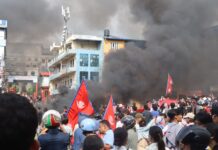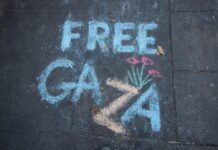Chinaworker.info reporters
A photograph of two Chinese hurdlers congratulating each other after a race in the recent Asian Games in Hangzhou has fallen foul of regime censors.
Lin Yuwei and Wu Yanni embraced each other after Lin took the gold medal in the 100 meters hurdles on 1 October. Wu came second but was disqualified for making a false start. The athletes had competed in the 6th and 4th lanes, hence the numbers on their shorts. In the photo the two numbers inadvertently combined to form “64” which is a taboo number for the ruling dictatorship.
Although many young Chinese know nothing about this historical incident, “64” is a commonly used reference to the June 4 massacre in 1989. Tens of thousands of PLA soldiers with tanks brutally crushed the mass demonstrations for democratic rights in the central areas of Beijing including in Tiananmen Square on the night of June 3-4.
The protests, initially led by students but then massively reinforced as workers joined the struggle, had raged for seven weeks following the death of former CCP general secretary Hu Yaobang on April 15, 1989. The movement drew support from millions and spread to more than 100 cities around demands such as “Down with autocracy” and “Down with corruption”. The order to crush the protests was given by Deng Xiaoping and a group of CCP elders, with Deng saying he would be prepared to “kill 200,000 people in exchange for 20 years of stability”.
Slow to react
The 19th Asian Games were held in Hangzhou from September 23 to October 8, having been postponed for a year due to the pandemic. China’s athletes won 383 medals including 201 gold medals, topping the medal table. Japan came second with 52 gold medals and South Korea (ROK) third with 42. A total of 45 countries took part.
Initially, state media failed to notice or understand the dastardly symbolism of the numerical combination shown in the picture of Lin and Wu. Xinhua and CCTV News shared the photo widely, but then abruptly deleted it and all related content. Weibo followed suit by censoring posts that shared the image. Outside the firewall, the photo has spread virally in overseas media and social media.
This incident is an example of how censorship and thought control are becoming more problematic and challenging for the regime of Xi Jinping even as the government’s obsession with “security” increases. In Hangzhou during the Asian Games public security was tightened as is routine whenever important and politically symbolic events are staged.
Residents living in the vicinity of the Games were told to keep their windows closed at all times and not to look out or stand near them. On social media platforms photos were shared including one sign that read: “Window sealed for the duration of the Asian Games.” Several commentators saw parallels with the zero-COVID lockdowns, including the fact that some food deliveries were also disrupted by the Hangzhou security measures as drivers and couriers found their access to certain districts was blocked.
Distrust of masses
The CCP regime is conflicted in its management of high-profile sporting events. It uses the prestige and pageantry of hosting such events to boost its global image and authority at home. Like all capitalist regimes it wants to use such events as mass distractions from political failings and crises, and to generate nationalism. But at the same time, with distrust and fear of the masses part of the CCP’s political DNA, it enters a state of heightened nervousness during such events.
During the football World Cup in Qatar last November, the sight of stadiums full of spectators mostly without COVID face masks became a high-trending topic on China’s social media. State censors went into overdrive to suppress discussion on this matter because the CCP at least outwardly was still insisting on full zero-COVID enforcement. At this time around 500 million Chinese people were under some form of lockdown.
At first state broadcasters like CCTV were taken by surprise by the politically sensitive images from the World Cup, but soon corrected this ‘mistake’. Using a 30-second delay mechanism on broadcasts that gives censors more time to respond to ‘problems’, they replaced crowd close-ups with shots of team managers or anything other than the maskless fans.
chinaworker.info has this year re-issued our banned 2009 book about the 1989 mass democracy struggle and June 4 massacre. The new edition is expanded with extra historical material. Our book is unique among various histories of the 1989 movement in that it focuses on the role of the working class as the decisive force in any movement for social change.
Liberal historians and bourgeois democrats exclusively focus on the role of the students and obscure the workers’ role, denying also that 1989 was a revolutionary struggle. Whereas the default position of the CCP is to blackout these events, otherwise slandering it as a “riot” by criminal elements. With so many false versions in circulation it is critical for socialists and the new generation of leftist youth in China to seek the truth and a Marxist analysis of the class forces behind this world-changing event.
You can order the PDF of our book Seven Weeks That Shook the World from our online store: https://chinaworker.info/en/%E7%B6%B2%E5%BA%97/tiananmen-1989-seven-weeks-that-shook-the-world/




